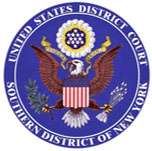Grand Upright Music, Ltd. v. Warner Bros. Records Inc.
| Grand Upright Music, Ltd v. Warner Bros. Records Inc. | ||||||
|---|---|---|---|---|---|---|
 United States District Court for the Southern District of New York | ||||||
| December 17, 1991 | ||||||
| ||||||
| Presiding judge | ||||||
| Kevin Thomas Duffy | ||||||
| Holding | ||||||
| That the Defendants had tried to secure a license from plaintiff prior to sampling its copyrighted song helped establish that their copyright infringement was knowing and intentional and that plaintiff was the valid copyright holder. Preliminary injunction granted. | ||||||
| Laws applied | ||||||
| Copyright Act of 1976 (not cited) |
Grand Upright Music, Ltd v. Warner Bros. Records Inc., 780 F. Supp. 182 (S.D.N.Y. 1991), was a copyright case heard by the United States District Court for the Southern District of New York. The case pitted singer/songwriter Gilbert O'Sullivan against rapper Biz Markie after Biz Markie sampled O'Sullivan's song, "Alone Again (Naturally)". The court ruled that sampling without permission can qualify as copyright infringement. The judgment changed the hip hop music industry, requiring that any future music sampling be preapproved by the original copyright owners to avoid a lawsuit.[1]
The case
Biz Markie, a rapper signed to Warner Bros. Records, had sampled a portion of the music from the song "Alone Again (Naturally)" by singer/songwriter Gilbert O'Sullivan, for use in "Alone Again", a track from Markie's third album, I Need a Haircut. Biz Markie and his production and recording companies were listed as co-defendants with Warner Bros. in the subsequent lawsuit.
Judge Kevin Thomas Duffy granted an injunction against the defendant, Warner Bros. Records, despite Warner Bros.' claim that Grand Upright did not own a valid copyright in the sampled song. Warner Bros. denied that Grand Upright owned the copyright to the song, though Grand Upright produced documentation that O'Sullivan had transferred title to them, and O'Sullivan himself testified to that regard. It also appears that the defendants unsuccessfully urged the court to take note of how common unapproved sampling was in the industry, because the court noted that "the defendants...would have this court believe that stealing is rampant in the music business and, for that reason, their conduct here should be excused."
The decision received some criticism for stating that "the most persuasive evidence that the copyrights are valid and owned by the plaintiff" was that Warner Bros. had previously attempted to obtain permission to use the song. However, this would not legally establish that Grand Upright was in fact the owner, but only that Warner Bros. believed that the song was copyrighted by someone, which would make their infringement knowing and willful. As Grand Upright had provided evidence that specifically established the copyright was theirs, the ruling did not hinge on this point, however.
The court wrote that "it is clear that the defendants knew that they were violating the plaintiff's rights as well as the rights of others. Their only aim was to sell thousands upon thousands of records. This callous disregard for the law and for the rights of others requires not only the preliminary injunction sought by the plaintiff but also sterner measures." The judge then referred the matter to a United States Attorney for criminal prosecution due to the defendants' intentional copyright infringement. (No criminal charges were filed.)
Judge Duffy has been criticized for his opinion in Grand Upright v. Warner, not because the decision was wrong, but because of Duffy's seeming bias in admonishing the defense and referring the defense for criminal prosecution.[2] Such criticism points out that Duffy's written opinion begins with the admonition taken from the Bible, "Thou shalt not steal." According to The Copyright Infringement Project of UCLA Law and Columbia Law School, Judge Duffy's opinion in Grand Upright v. Warner demonstrates "an iffy understanding on the part of this judge of the facts and issues before him in this case."[3]
Impact on music
As a result of the court case, the sound of hip hop music, heavily based upon combinations of various samples from various sources, was forced to change. Records such as those produced by The Bomb Squad for Public Enemy, filled with literally dozens of samples, were no longer possible: each and every sample had to be cleared to avoid legal action. Sample clearance fees prohibited the use of more than one or two samples for most recordings, with some holders of mechanical rights to recordings demanding up to 100% of royalties generated by the new song.[4]
As a result, interpolation (replaying the requested sample using new instrumentalists, using the newly recorded version and simply paying the songwriters—and not the artist or the label—for use of the composition) became prevalent in the industry, especially in the work of Dr. Dre. As early as 1989, Dr. Dre's production was styled around fewer samples per track, studio instrumentation, and heavy sampling from artists – Parliament-Funkadelic most notably in Dre's case – who were amenable to having their music sampled by hip hop producers.
"Alone Again" is not available on current releases of Markie's Haircut album. His next album was entitled All Samples Cleared!
Sources and notes
- ↑ Music Sampling and Copyright Law (PDF), p. 21
- ↑ The Copyright Infringement Project: Grand Upright v. Warner
- ↑ The Copyright Infringement Project: Grand Upright v. Warner
- ↑ McLeod, Kembrew (February 2005) [2005], Freedom of Expression®: Overzealous Copyright Bozos and Other Enemies of Creativity (PDF) (1st ed.), New York, London, Toronto, Sydney, Auckland: Doubleday, pp. 62–113, ISBN 0-385-51325-9